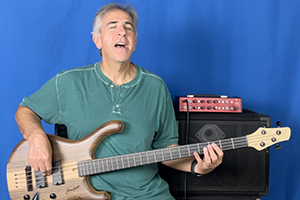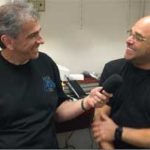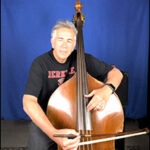The best way to balance life in the practice room with life on the stage
By Jon Liebman
Week of September 13, 2021
There are two things you need to keep in mind when learning bass – or any instrument, for that matter:
1) How you sound by yourself; and 2) How you sound as part of a band.
Both are vitally important. But how do we balance these two concepts?
I was speaking with Big Wreck bassist Dave McMillan recently, in a conversation published as this week’s FBPO interview. Dave has been in all kinds of musical situations, both live and in the studio. He’s played in a variety of musical styles, including jazz, rock, and more.
When I asked him what advice he had for someone who wants to learn bass, his answer was spot-on when it comes to finding that balance.
“I really think that if you’re going to start to learn bass,” Dave says, “a really important thing is to be able to listen not just to yourself, but hearing the band as a whole and fitting into that.”
So true. When you’re alone in the practice room, all you hear is you. You’re focused on whatever you’re learning at the time, whether it’s scales, grooves, transcriptions, whatever. How then, when you get together with others as a member of a band, do you take what you’ve practiced and make it sound good as a team member, rather than an isolated player?
“I think it’s very important for people to be able to listen to a song from the outside,” Dave continues, “to see it from a bird’s eye view with your ears.”
I’ve never heard it put quite that way, but I love the imagery of what Dave is saying.
“Once I realized that,” he says, “I started to progress quite a bit because it wasn’t just about me anymore. It was about making the song as good as it can be.”
Read the previous paragraph again before continuing. Then read it again.
“You always want to show off what you can do,” says Dave, “but sometimes that gets in the way of the song. Like, what is it that you’re trying to actually get across to people?”
Those words are vitally important. But if that’s the case, why should we practice our Jaco licks, our Victor Wooten stuff, Billy Sheehan, Stu Hamm…?
“Everything’s got its place,” says Dave, “but you know, just because I learned how to play some crazy diminished line, where I can do this cool phrase, and all this kind of cool stuff… if you throw that in the wrong context, it’s not going to sound good and it’s going to take away from the song. You’ve got to play for what the song is about.”
If you’re a regular follower of my blog, you’ve no doubt seen me drive this point home again and again. So when I come across a new twist, a new perspective on the subject, I like to share it with you.
When you’re part of a band, or especially if you’ve been given a written part where you’re reading notes that somebody else has written for you, it’s important to know why those particular notes were chosen and how to interpret them accurately, sensitively, and most importantly, musically.
“I think it’s understanding what the song is about,” Dave says, “understanding what the emotional impact of that song is supposed to be, and all those things come into play when it’s time to actually play the song. So yeah, I think you’ve just got to serve the song and let it do its thing.”
The emotional impact! That’s everything right there. That’s why we like music, because of the way it makes us feel, the emotional impact it has on us.
So whether you’re practicing by yourself or if you’re playing with others, let the emotional impact be the glue that holds these two elements together. And if you do it right, you’ll be injecting your own emotions into the music, surely making you a better bass player.
What about you? Have a thought on the subject? Leave a comment below and let me know what you think. In the meantime, check out my interview with Dave here.





It’s tools in the tool box. You take the tools to the job site. But you only use the ones appropriate to getting the specific job done.